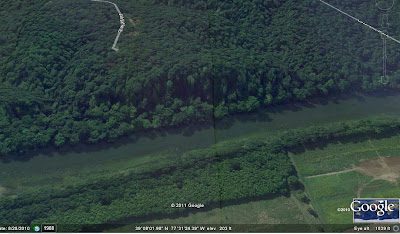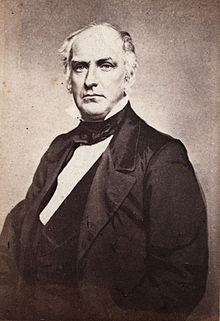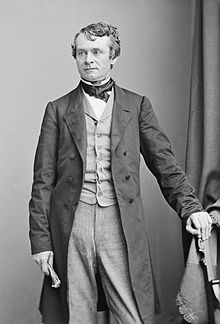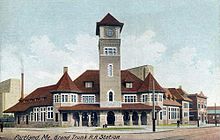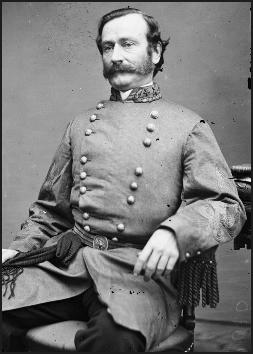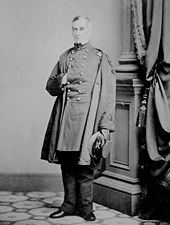 |
| Baker Wounding Marker At Ball's Bluff |
Report of Col. Charles Devens, Fifteenth Massachusetts Infantry.
HDQRS. FIFTEENTH REGIMENT MASS. VOLUNTEERS,
Poolesville, Md., October 23, 1861.
…..At daybreak we pushed forward our reconnaissance towards Leesburg to the distance of about a mile from the river, to a spot supposed to be the site of the rebel encampment, but found on passing through the woods that the scouts had been deceived by a line of trees on the brow of the slope, the opening through which presented, in an uncertain light, somewhat the appearance of a line of tents….I determined not to return at once, but to report to yourself, which I did, by directing Quartermaster How to repair at once to Edwards Ferry to state these facts, and to say that in my opinion I could remain until I was reinforced….Mr. Howe left me with his instructions at about 6.30 a.m., and during his absence, at about 7 o’clock, a company of riflemen, who had probably discovered us, were reported on our right upon the road from Conrad’s Ferry. I directed Captain Philbric, Company H, to pass up over the slope and attack them, while, while Captain Rockwood, company A, was ordered to proceed to the right and cut off their retreat in the direction of Conrad’s Ferry, and accompany Captain Philbrick as he proceeded to execute the order.
Reports of Brig. Gen. N. G. Evans, C. S. Army, with correspondence.
HEADQUARTERS SEVENTH BRIGADE
Leesburg, Va., October 31, 1861.
…Early on Monday morning, the 21st instant, I heard the firing of my pickets at Big Spring, who had discovered that at an unguarded point the enemy had effected a crossing in force of five companies and were advancing on Leesburg. Captain [Wm. L.] Duff, of the Seventeenth Regiment, immediately attacked him, driving him back, with several killed and wounded.
On observing the movements of the enemy from Fort Evans at 6 o’clock a.m., I found he had effected a crossing both at Edwards Ferry and Ball’s Bluff, and I made preparations to meet him in both positions, and immediately ordered four companies of infantry (two of the Eighteenth, one of the Seventeeth, and one of the Thirteenth) and a cavalry force to relieve Captain Duff; the whole force, under thfer, who was directed to hold. Col. W. H. Jenifer, who was directed to hold his position till the enemy made further demonstration of his design of attack. This force soon became warmly engaged with the enemy, and drove them back for some distance in the woods.
At about 10 o’clock I became convinced that the main point of attack would be at Ball’s Bluff, and ordered Colonel Hunton, with his regiment, the Eighth Virginia Volunteers, to repair immediately to the support of Colonel Jenifer. I directed Colonel Hunton to form line of battle immediately in the rear of Colonel Jeniffer’s command and to drive the enemy to the river; that I would support his right with artillery.
Report of Col. Charles Devens, Fifteenth Massachusetts Infantry.
HDQRS. FIFTEENTH REGIMENT MASS. VOLUNTEERS,
Poolesville, Md. October 23, 1861.
… At about 10 o’clock Quartermaster Howe returned and stated that he had reported the skirmish of the morning, and that Colonel Baker would shortly arrive with his brigade and take command. Between 9 o’clock and 11 o’clock I was joined by Lieutenant-Colonel War with the remainder of my regiment, making, in all, a force of 625 men, with 28 officers, from my regiment, as reported to me by the adjutant, many of the men of the regiment being at this time on other duty.
POOLESVILLE,December 2, 1861.
…Stated concisely, the narrative would be this:
General Stone directed Colonel Baker to go to the right and in his discretion to recall the troops then over the river or cross more force. Colonel Baker made up his mind and declared it before he reached the crossing place, to cross with his whole force.
General Stone directed five companies to be thrown into a strong mill on the right of Ball’s Bluff. Colonel Baker allowed these companies to be diverted to the front.
General Stone sent cavalry scouts to be thrown out in advance of the infantry on the right. Colonel Baker allowed this cavalry to return without scouting and did not replace it, although he had plenty at his disposition.
Colonel Baker assumed command on the right about 10 a.m., but never sent an order or messenger to the advanced infantry until it was pressed back to the bluff about 2.15 p.m.
Colonel Baker spent more than an hour in personally superintending the lifting of a boat from the canal to the river, when a junior officer or sergeant would have done as well, the mean time neglecting to visit or give orders to the advanced force in the face of the enemy.
No order of passage was arranged for the boats; no guards were established at the landing; no boats’ crews detailed.
Lastly, the troops were so arranged on the field as to expose them all to fire, while but few could fire on the enemy. His troops occupied al the cleared ground in the neighborhood, while the enemy had the woods and the commanding wooded height, which last he might easily have occupied before the enemy came up.
……
CHAS. P. STONE
Report of Col. Charles Devens, Fifteenth Massachusetts Infantry.
HDQRS. FIFTEENTH REGIMENT MASS. VOLUNTEERS,
Poolesville, Md. October 23, 1861.
…About 12 o’clock it was reported to me a force was gathering on my left, and about 12.30 o’clock a strong attack was made on my left by a body of infantry concealed in the woods and upon the skirmishers in our front by a body of cavalry. The fire of the enemy was resolutely returned by the regiment, which maintained its ground with entire determination. Re-enforcements not yet having arrived, and the attempts of the enemy to outflank us being very vigorous, I directed the regiment to retire about 60 paces into an open space in the wood, and prepare to receive any attack that might be made, while I called in my skirmishers. When this was done I returned to the bluff, where Colonel Baker had already arrived. This was at 2.15 p.m.
Report of Col. Milton Cogswell, Forty-second New York Infantry.
NEW YORK, September 22, 1861.
…Colonel Baker welcomed me on the field, seemed in good spirits, and very confident of a successful day. He requested me to look at his line of battle, and with him I passed along the whole front. He asked my opinion of his disposition of troops, and I told him frankly that I deemed them very defected, as the wooded hills beyond the ravine commanded the whole so perfectly, that should they be occupied by the enemy he would be destroyed, and I advised an immediate advance of the whole force to occupy the hills, which were not then occupied by the enemy. I told him that the whole action must be on our left, and that we must occupy those hills No attention was apparently paid to this advice and Colonel Baker ordered me to take charge of the artillery, but without any definite instructions as to its service.
Report of Capt. William F. Bartlett, Twentieth Massachusetts Infantry.
CAMP BENTON, October 23, 1861.
…The enemy now opened on us from the woods in front with a heavy fire of musketry, which was very effective. They fired low, the balls all going within 1 to 4 feet of the ground….It was a continual fire now, with occasional pauses of one or two minutes, until the last. The rifled cannon was on the left in the open ground, in front of a part of Baker’s regiment, exposed to a hot fire. It was not not discharged more than eight times. The gunners were shot down in the first of the engagement, and I saw Colonel Lee carry a charge to the gun with his own hands. The last time it was fired the recoil carried it down the rise to the edge of the bank. The men of the Twentieth Regiment behaved admirably, and all that were left of them were on the field after the battle was declared lost by General Baker.
Report of Capt. Francis G. Young, of Colonel Baker’s staff.
…Colonel Baker fell about 5 o’clock. He was standing near the left of the woods, and it is believed he was shot with a cavalry revolver by a private of the enemy, who, after Colonel Baker fell, crawled on his hands and knees to the body and was attempting to take his sword, when Captain Bieral with 10 of his men rushed up and shot him through the head and rescued the body.
Report of Col. Milton Cogswell, Forty-second New York Infantry.
NEW YORK, September 22, 1862.
….Captain Harvey, assistant adjutant-general, reported to me that, Colonel Baker having been killed, I was in command of the field, and that a council of war was being held by the remaining colonels. I repaired to the point occupied by Colonels Lee and Devens, and found that they had decided on making a retreat. I informed them I was in command of the field; that a retreat across the river was impossible, and the only movement to be made was to cut our way through to Edwards Ferry, and that a column of attack must be formed for that purpose.
….Having given these orders, I proceeded to the front, and finding our lines pressed severely, I ordered an advance of the whole force on the right of the enemy’s line. I was followed by the remnants of my two companies and a portion of the California regiment, but for some reasons unknown to me, was not joined by either the Fifteenth or the Twentieth Massachusetts Regiments. We were overpowered and forced back to our original position, and again driven from that position to the river bank by overwhelming numbers. On the river bank I found the whole force in a state of great disorder….We were almost immediately surrounded and captured. This took place shortly after dark, and my personal knowledge of the transactions of the day ended here.
Official Records, Series I., Vol. 5, Pages 289-372.
Ball’s Bluff was a battle without a reason. It was known that Evans was near Leesburg and McCall’s movement had not compelled him to fall back. McClellan’s question was answered. If the Union force had been able to press Evans, he simply would have fallen back on Manassas as per his instructions. But Stone managed the battle from a distance and the kindest thing which can be said of Baker was that he was out of his element. Baker had been promised a promotion by Lincoln once he had success on the field of battle, and there is little doubt Baker’s decisions were clouded by that possibility. Evans, with his experiences on the frontier was a tough customer, his Mississippi troops tougher still. He played his hand much as he had at Manassas, finding and maintaining the critical point on the battlefield. In the carnage and confusion, Federal losses were 921, including 714 prisoners. Confederate losses, were 149, with 33 killed. Baker was dead, McClellan would now be (if anything) even more cautious, and Stone would be ruined and his reputation smeared. Winter was coming, and the chilling realization of the cost of war setting in.


